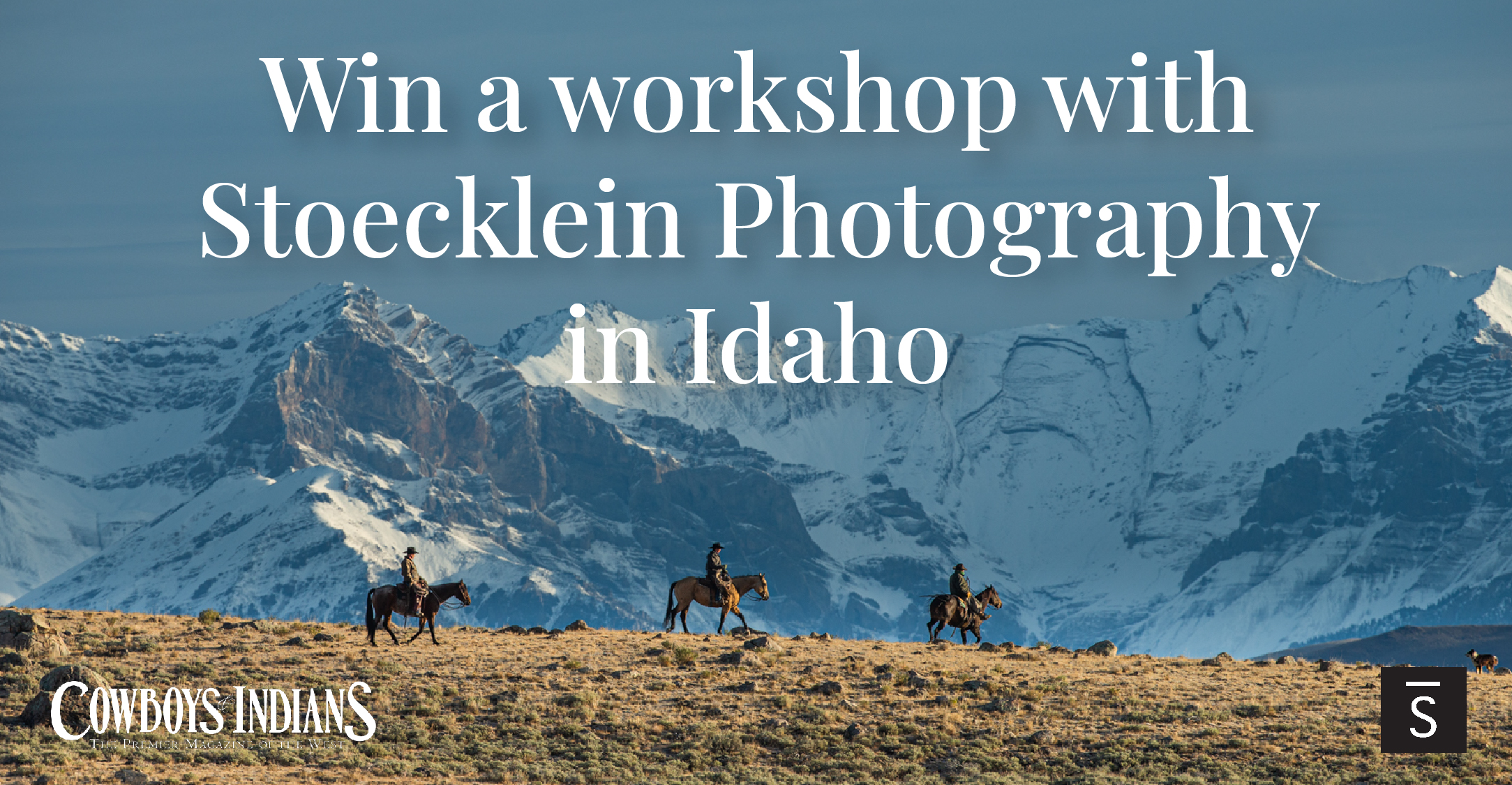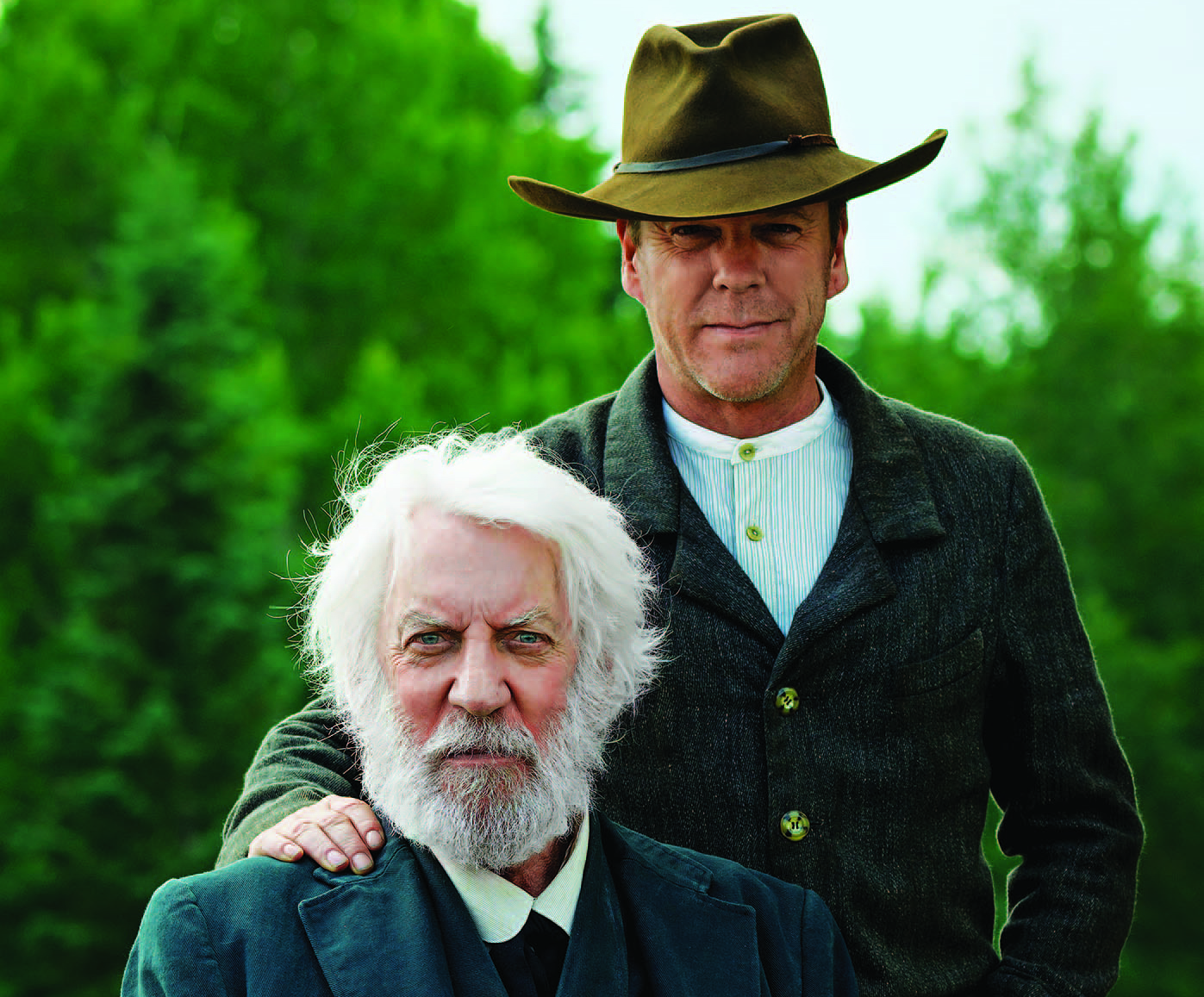For the first time in their towering careers, Kiefer Sutherland and his famous dad, Donald, appear on-screen as father and son — in a good old-fashioned western, Forsaken.
Kiefer Sutherland is back in the saddle. And this time, he has brought his father, veteran actor Donald Sutherland, along for the ride.
In Forsaken, an unabashedly old-fashioned and terrifically entertaining western set in 1872 Wyoming, the younger Sutherland plays John Henry Clayton, a notorious gunslinger who returns to his small hometown several years after his Civil War service. During the time since his military discharge, John Henry has acquired a well-earned reputation as a fearsomely efficient shootist. And despite his announced intention to hang up his guns, just about everyone in town — but especially his preacher father, the Rev. William Clayton (played, of course, by Kiefer’s dad) — is skeptical that he has had enough of death to last him a lifetime.
For a while, John Henry does his best to turn the other cheek, despite a couple of nasty run-ins with the minions of James McCurdy (Brian Cox), a ruthless businessman bent on forcing local farmers to sell him their land so he can profit from the approaching railroad. (Chief among those minions: Gentleman Dave Turner, a deceptively courtly rogue played by Michael Wincott as the most elegantly grandiloquent gunslinger this side of Val Kilmer’s Doc Holliday in Tombstone.) But when McCurdy and his men finally go too far — and strike too close to home — the preacher’s son backslides and unleashes a little hell.
It’s been 28 years since Kiefer Sutherland first rode hard and shot straight on-screen in Young Guns, the smash-hit 1988 western in which he appeared alongside Lou Diamond Phillips, Dermot Mulroney, Casey Siemaszko, and brothers Emilio Estevez and Charlie Sheen. During the decades since, he has amassed an impressive array of film and TV credits — including such diverse movies as A Few Good Men (1992), The Cowboy Way (1994), Eye for an Eye (1996), and Melancholia (2011), as well as the internationally popular TV series 24 — and distinguished himself off-screen as a prize-winning team roper on the U.S. rodeo circuit.
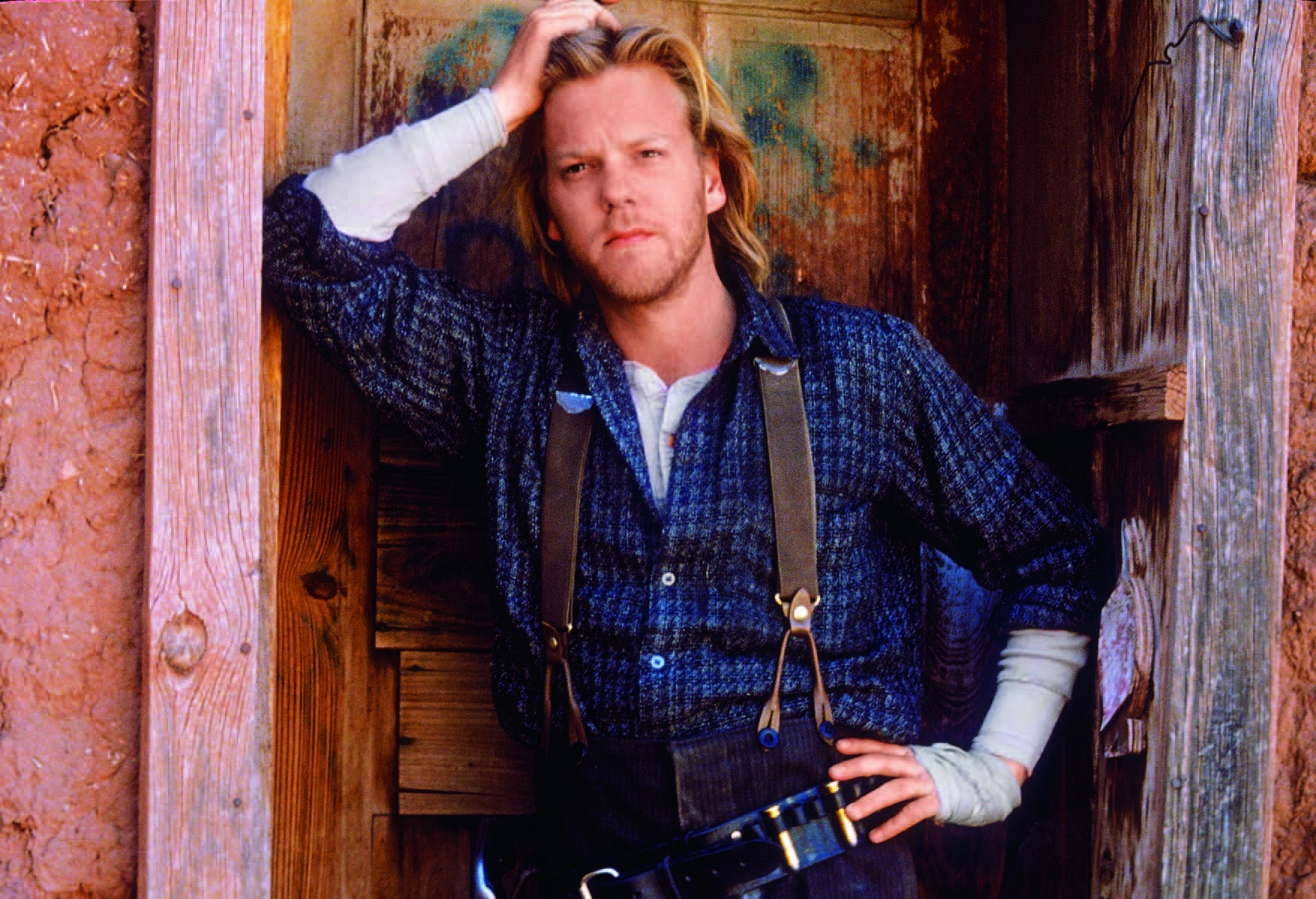
But in all his years of roping, riding, and acting, Kiefer managed only once to costar in a movie with his father, a showbiz living legend whose own film career spans more than 50 years. (Consider: The grandchildren of couples who saw M*A*S*H as a date movie back in 1970 may know Donald Sutherland not as the big-screen Hawkeye but as the bad guy in The Hunger Games franchise.) And even then, in A Time to Kill (1996), they didn’t actually share any scenes.
For 49-year-old Kiefer, the desire to at long last appear on-screen opposite 80-year-old Donald was a major reason why he was so eager to make Forsaken, a dream project for which he spent several years seeking financing. Another important reason: Kiefer is a true-blue, rip-roaring fan of the western genre. “Unless you’ve got aliens in the western,” he joked during an exclusive interview with C&I. “That’s always a bad idea.”
Not surprisingly, there are no extraterrestrials in Forsaken. But there is a compelling father-son relationship at the heart of the film, and it brings out the very best in both of the lead actors.
Cowboys & Indians: You and your father obviously are playing fictional characters in Forsaken. But how much does the relationship between those characters reflect your own real-life father-son bond?
Kiefer Sutherland: You have to understand that I developed this film from the ground up. So I probably drew on our relationship more consciously in creating a dynamic that would be interesting for the two of us to play. That came up in my conversations with [screenwriter] Brad Mirman. I think it’s something that’s quite usual for any father and son, the things you need to address at different stages of your life. I really wanted to create a dynamic for that.
What was complicated for me, in terms of our relationship, was growing up and not being around him very often, or not having him in my life. Later in life when I got to spend more time with him, and when I had children of my own and I understood that dynamic of what he did for a living and how much that can take you away, a lot of the disappointment I had as a young man about not being able to spend more time with my father, it dissipated. Even that is a factor in this movie, in the context of the fact that the young man, in fact, has been gone for a very long time, and the father has missed him.
C&I: Do you remember how old you were when you realized just what it was your father did for a living?
Sutherland: Yeah. I was always aware that he was an actor. But when I was growing up, you could really only go see movies in a movie theater — and his movies were all for adults, so I wasn’t allowed to go see those. When I was really, truly aware, I think I had just turned about 17, and I was in Los Angeles. I was already working and about to get ready to do a film called Stand by Me. I was staying at a family friend’s house until I got an apartment, and he had — this is ironic — Beta tapes of every film my father had made. So in about two or three days, I watched Don’t Look Now, 1900, Casanova, Ordinary People, Day of the Locust, Klute, and M*A*S*H.
And after that, I remember phoning my dad and telling him how sorry I was that I didn’t realize, at least in my opinion, how important he was as an actor. I was embarrassed that, as a son, I hadn’t known that. Of course, in hindsight, I can look back on it and say, Well, how on earth would I have known? But I was so moved by not only how excellent he was, but also the diversity in the characters he played. And he had a command as an actor that I was just so impressed with. That happened in a two- or three-day period, while I was watching his films, and it had a really profound effect on me. I think that was kind of a seminal moment for me, in the sense that most children try to distance themselves from their parents, and it’s part of a growing process where you try to move on and find your own way. But I remember after that three-day period, that was the moment where I discovered that, certainly as an actor, he was someone I would want to emulate. That was a big shift for me.
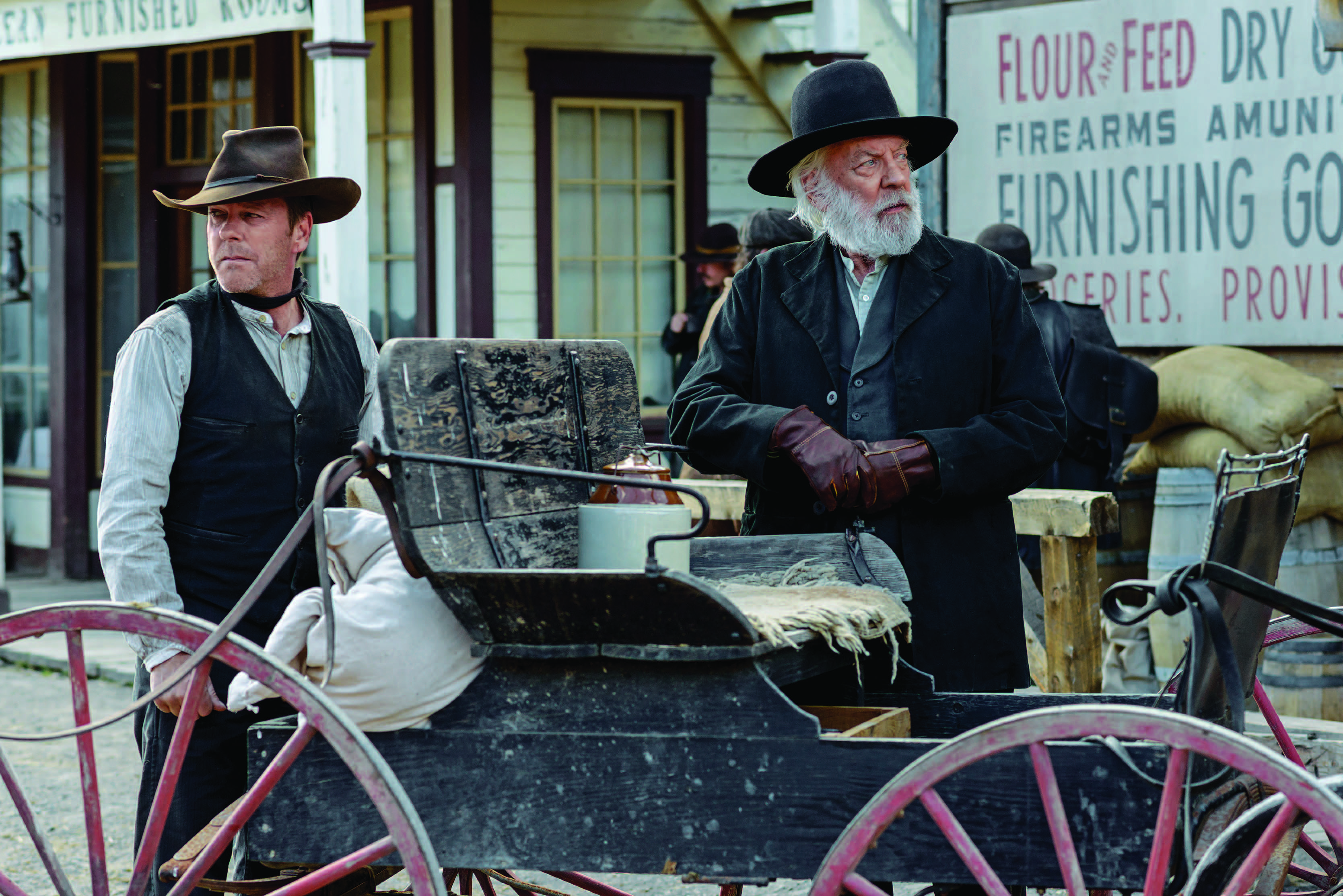
C&I: The two of you share an extraordinarily affecting moment in Forsaken, where your father takes hold of your arms — he knows you’ve got to leave, but he doesn’t want you to leave — and you’re both on the verge of tears. Again: It’s acting, you’re playing roles. But because it’s a real father with his real son, the scene is all the more powerful.
Sutherland: I will tell my father you said that. And thank you. Yes, there are a few points in the film that have always felt to me like they were ours. There were moments for us as a father and a son in reality, from a lifetime of things unsaid and maybe not done or finished, that were there. I had another moment in the church where that emotional breakdown had nothing to do with what was on the page — it was a very odd, personal thing that I just shared with him. It was in a space where I knew that’s what was required for telling the story.
I think that scene you’re talking about also was his personal expression back to me. I only can say that because I know what he said to me when we finished shooting that scene. We only shot it twice, and I looked back to him, and the director, Jon Cassar, came up and said, “That was beautiful. I don’t need any more.” I’m on the horse and I ride back and my father looks at me and he says, “Are we good?” I said, “Yeah, we’re good.” And he wasn’t talking about the scene, either. You know what I mean? There’s a couple moments in this film that were really shared moments between us as two people, and as a father and a son. I’m going to almost start crying over the phone for you here as I remember him saying that “Are we good?” And I said, “Yeah.” He smiled, and that was that.
This film means a great deal to me, obviously — more than any other single thing I’ve done — for those moments.
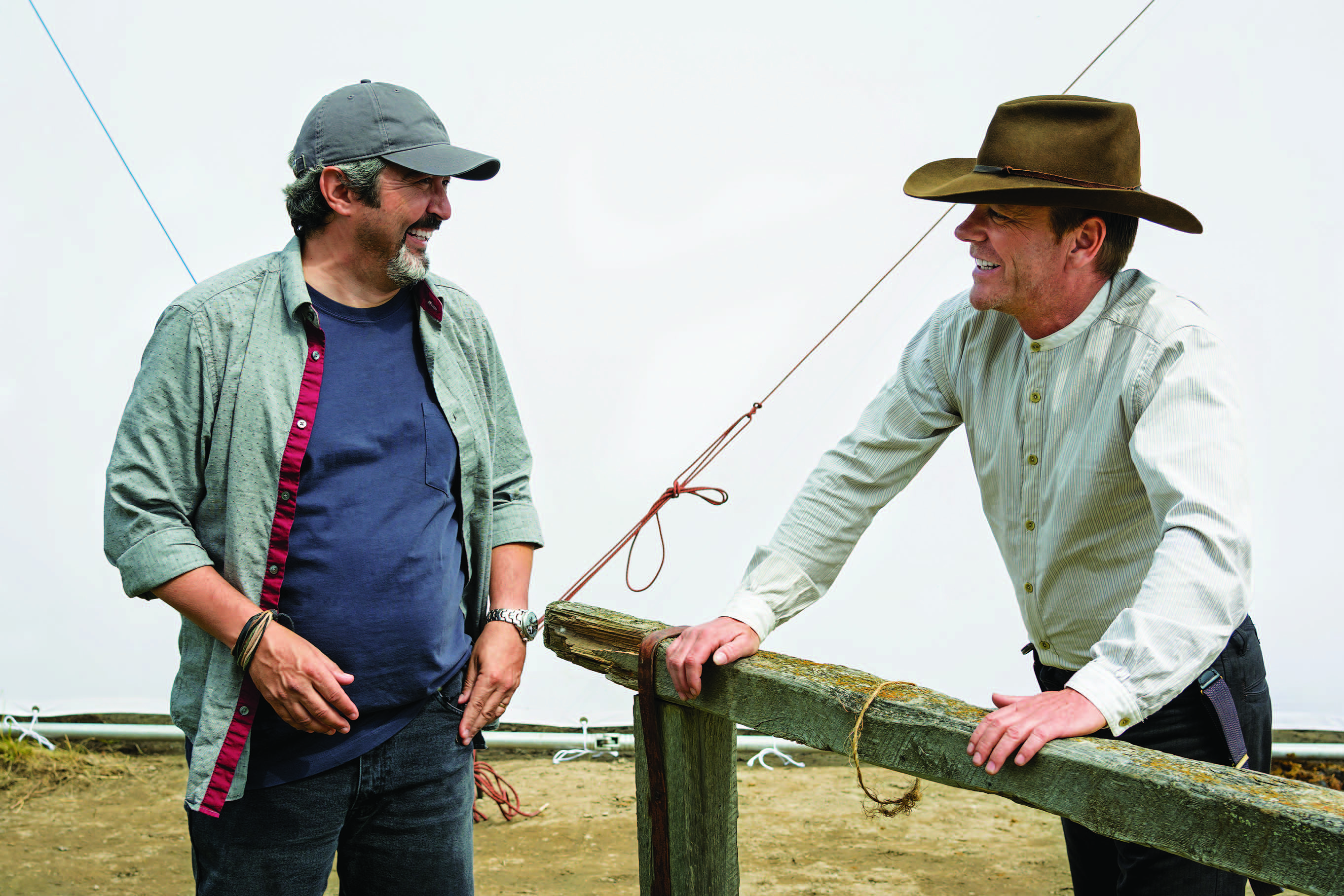
C&I: It took a long time for you to set up this film. Was that because it was a western? Were you repeatedly told westerns weren’t popular or commercial anymore?
Sutherland: Yeah, I was. And every time, I brought up the last 10 westerns that were made and how they all did incredibly well and did incredibly strong business. I think the argument is very, very hollow. And it’s usually made by a 20-something male executive in the studio who has no perspective on film history at all.
Speaking for myself, I know that whenever I get a chance to go see a western, I will go see it. Whether that’s The Hateful Eight or anything else. I’m flicking through the television yesterday and I saw Lonesome Dove was on — and I ended up sitting for five hours watching that. I know that I’m not an anomaly. I know that there is a beauty in the western in its simplicity. There are good people and there are bad people. And we look back on the western as a view of a simpler life — when you survived by your strength or your wit, or you perished by your weakness. The western reveals that.
C&I: You earned your spurs fairly early in your career, with Young Guns back in 1988. And, of course, there was the period when you competed on the rodeo circuit in team roping events. How did you get to be so adept as a horseman?
Sutherland: Years ago, I went to go visit a friend of mine in Montana for the summer and I just got into horses. It was just something I had a natural affinity for. When I finished the Young Guns picture, I ended up moving to Montana and started raising horses. And then, instead of just simply raising ranch horses, I started raising roping horses because I had gotten into that. And, again, I was really lucky because I had a natural affinity for it. So it was something that I tried to follow through with and get better at. It was just something that I really loved doing. Oddly enough, as an actor, [my riding experience] served me really well, whether it was for The Three Musketeers or The Cowboy Way.
There’s something really unique about the partnership between a horse and a rider. It’s not like a car, where you can command the car to do whatever you want. There has to be a real understanding between a rider and a horse to work together. And that has to be earned. It’s a two-way street. The horse has to earn the respect of the rider, and the rider has to earn the respect of the horse. There’s something about that combination that I find romantic on some level. It’s something I rely on when I have that kind of relationship with a horse. I actually have more faith in that horse than I would a brand-new car coming off a lot.
C&I: Do you still have the horse ranch?
Sutherland: I do not, no. 24 put an end to my ranching days. [Laughs.] 24 pretty much put an end to everything but 24 for a while.
C&I: Including, presumably, team roping. Do you miss competition on the rodeo circuit?
Sutherland: I do. I liked it due to the fact that I had never gone to college. I left school and started working as an actor and was incredibly fortunate to be able to do as well as I have. But having never gone to college — well, I think there’s a real social experience that’s quite important that young people get from college or university. I got that when I went with two cowboys — John English, who I met on The Cowboy Way, and another cowboy named Steve Gilson — and we got in the truck and we just went from town to town. We did it for about a year and a half to two years, and it was one of the best times of my life. It was kind of like being in a rock band, but we had horses and ropes. We were roping in the rodeo during the day and having some of the best nights I’ve had in my life. I always consider that as my university experience.
C&I: You appear to have graduated with honors.
Sutherland: Trust me, you can fill the Grand Canyon with better cowboys than me. I did all right. I remember when I was at the [United States Team Roping Championships], there were catcalls from people calling me Hollywood and stuff like that. But then I won a couple roping events — I think Phoenix was the first one — and all of a sudden, the same people that were kind of making fun of me started asking me, “If you need someone to rope up in Albuquerque, you know, I’ll be your partner.” That was kind of when I felt accepted by that group, and that meant a great deal to me.
C&I: You mentioned 24, which pretty much established you as a two-fisted hero. But there was a stretch in your career when you were sort of typecast as, well, shall we say, “unpleasant” characters. ...
Sutherland: [Laughs.] Oh, yeah. The trouble is, once you start playing those kinds of characters — and it’s not something I realized about our industry, because I was quite young at the time — but once you start playing characters like that, that ends up being what you’re going to do for a while.
C&I: You were probably at your best being at your worst in director John Schlesinger’s Eye for an Eye, the 1996 drama where you played a psycho who rapes and kills a young woman, gets off on a legal technicality, and is targeted for revenge by Sally Field as the victim’s mother.
Sutherland: That was the hardest part I’ve ever played.
C&I: Really?
Sutherland: Oh my God, yeah. You have to understand: Here I was, the father of two daughters, and that character was the root of all evil. The reason why I did it was John Schlesinger was a filmmaker I wanted to work with. He wanted to make a movie about the criminal justice system and why people thought it was failing — and how desperate people had become to seek out justice. And I thought that that was a really interesting idea. Unfortunately, I wasn’t the right gender to play Sally Field’s part, but the part he wanted me for was this other character.
I thought it was a really interesting challenge. And a challenge it was. It was really difficult to do. And I know that it hurt my career quite a bit when I did that. Because the character was so awful, people really didn’t want to have very much to do with me for a little while after that.
I remember I was at a hockey tournament, I think just outside Phoenix, Arizona, and I remember I saw a guy who I had been friends with for a long time. I went over to say hello, and his girlfriend would not shake my hand, because she had just seen Eye for an Eye. I spent the next hour trying to explain to her that it’s a movie and it’s not me.
C&I: OK, let’s wrap this up with a couple of lists. Quite often at film festivals, they have retrospectives to honor actors. If you had to choose four films for retrospectives honoring yourself and your father — not necessarily your best films, but lineups that reflect the diversity of your work — what titles would you choose?
Sutherland: I’ll start with mine first. Mine would be The Lost Boys, Young Guns, Dark City, and Melancholia. My father’s are going to be much more difficult for me to choose, but I’m going to have a swing at it. [Pauses.] Well, I’m going to have to do six for him: M*A*S*H, Don’t Look Now, Ordinary People, Eye of the Needle, Fellini’s Casanova, and [Bernardo] Bertolucci’s 1900.
C&I: You know, as evil as you were in Eye for an Eye, your father was just as scary in 1900.
Sutherland: [Laughs.] Trust me, my father and I have had this discussion.
C&I: I mean, he killed a poor cat in that movie. ...
Sutherland: Yeah, but when he saw Eye for an Eye, he called me up and said, “That was worse than me killing the cat!” I laughed forever — until I realized he wasn’t joking.
C&I: Well, at least you’re both on the side of the angels in Forsaken.
Sutherland: I have to tell you, whether people like westerns or they don’t, or they like this kind of a movie or they don’t, there is one thing about this film that I just think is going to be so personal to men of any age, whether they’re the father or the son. The dynamic between a father and a son is really the same for everyone. The experiencing of it is different, but there are the moments when the reverence of a father from a son’s viewpoint has to shift for that son to become a man. And that’s really what this film is about. It was so interesting to be able to make a film about that.
Forsaken opens February 19, 2016, in limited release in the U.S.
From the April 2016 issue.




